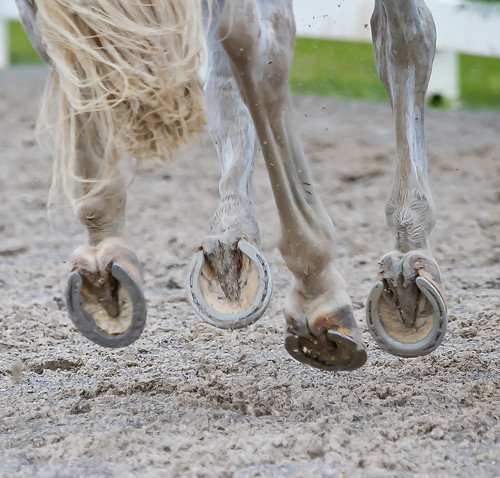Stable Management – Top 3 Thrush Symptoms and Thrush Treatments for Your Horse’s Hooves
What are Thrush Symptoms

Hoof thrush is a smelly condition of the horse’s hoof characterized by the following major symptoms:
- Distinctive (emphasis on stink) odor. When picking out the horse’s hooves the smell can be identified immediately.
- Characteristic black goo. When cleaning out the feet there is a slimy black goo that is present. This is noticed in the cleft of the frog, grooves and sometimes on the sole. The black rotten material is caused by a bacterial infection which develops when the hoof is subject to long periods of dampness.
- Lameness in the affected hoof. Some horses appear to have solid healthy hooves and then underneath there can be a layer of rotten hoof material.
What Causes Thrush
Most horses have bacteria and fungus growing in their hooves. Some horse owners do not notice that their horse’s are a ‘bit thrushy’ and the natural balance of the horse combats the thrush. If the bacteria, fungus or living conditions within the hoof become unbalanced, the fungus can grow and cause the smelly thrush to proliferate and disintergrate the horse’s hoof.
If we, as horse owners do recognize it, we usually are unable to completely obliterate the presence of thrush within the horse’s hoof.
Some Treaments for Thrush
Some common Thrush Treatments include:
- Daily picking out of the horse’s feet. This includes picking out manure, rocks and mud from the clefts and grooves within the foot.
- Scrub the hoof with soap and water. Simple scrubbing with soap and water will dry the area and stop the spread and growth of the fungus/bacteria associated with thrush.
- Keep the horse in a dry area. Clean bedding and a well drained paddock can keep the horses feet dry so it will not provide the horse’s hooves with an environment that thrush thrives in.
- Application of commercial preparations. Copper Sulphate preparations, Thrush buster and other remedies can assist horse owners with thrush treatments.
Other considerations are:
Make sure your horse has adequate room to move. This provides their hooves with beneficial circulation which encourages blood flow and this in turn prevents thrush.
Have a correct diet. your horses diet may effect its ability to fight off thrush. A low carbohydrate diet, and a ‘natural’ grass (not alfalfa) fed diet will help prevent thrush. Horses fed rich diet are more likely to sustain a thrushy hoof.
 Try these three powerful exercises to get strengthen your position.
Try these three powerful exercises to get strengthen your position.
